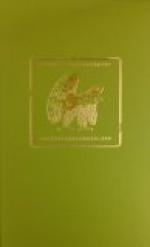At last, between the lightning flashes, the blackness was so dense it was hardly possible for Tisdale to see the road, and he could not trust the nervous team to keep the track; it was necessary to stop, at least to wait until the moon should rise. But while he was preparing to tell her so, the silence was broken by the barking of a dog. Instantly it was swelled by a deeper baying, and the echo rang a continuous clamor through the gorge. Then a faint illumination brought out in silhouette a final bluff ahead; rounding it, they saw a low-roofed habitation, and in the open door a woman with a lamp.
One of the dogs stood bristling and growling beside her; the other, barking furiously, sprang from the porch so that for a moment Tisdale was busy with the plunging team. Then the woman spoke, and the setter, whimpering, snapping furtively, crept back to her feet.
“We have been delayed by an accident,” Tisdale explained briefly, “and I want you to take this lady in for the night. Make her comfortable as possible, and I will see it is worth your while.”
“This ain’t much of a road-house.” The woman held the lamp higher to scrutinize the lady’s face. “We only got one room, an’ the best I can do is to double up with the kids an’ give you my bed.”
“That will do very well,” answered Tisdale quickly. “I can take care of myself. Of course there’s a stable somewhere out here in the dark, and a bale or two of hay.”
“No, we got a shed up, but we’re short on feed. We’re short on ’bout everything: flour, potatoes, bacon, beans. We’ve just took up this here claim, an’ things ain’t growed. But my man’s gone down to Wenatchee to fetch a load.” Then, seeing this fact was hardly one to solace her transient guests, she laughed shortly and went into the cabin to set the lamp on a table and bring a lantern that hung on the farther wall.
Tisdale turned to help Miss Armitage down. “We may be able to find better accommodations towards the Columbia, when the moon rises,” he said, “but I can’t be as sure of another—chaperon.” Then, looking into her face, he added in his minor key: “I am sorry, but you will make the best of things, I know. And the night will pass. Come.”
She slipped down beside him and stood holding her skirts out of the powdery soil, while her wide eyes searched that interior through the open door. Tisdale lifted the baggage from the buggy to the porch, then the woman returned with the lantern and, followed by the dogs, went to show him where he might stable the horses. After a moment Miss Armitage ventured up the low steps to the threshold. It was a portable cabin such as she had noticed from the train window at intervals where construction was incomplete along the new railroad. It was battered and weak, showing old earmarks of transportation, but it was furnished with a rusty cook-stove, some bench chairs, and two beds, which stood in the farther corners and nearly




